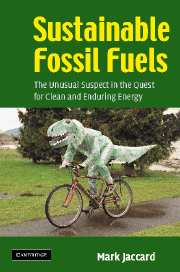Book contents
- Frontmatter
- Contents
- List of figures
- List of tables
- Preface
- Acknowledgments
- 1 What is energy sustainability?
- 2 Is our current energy path sustainable?
- 3 The prospects for clean secondary energy
- 4 The usual suspects: efficiency, nuclear and renewables
- 5 The unusual suspect: how long can fossil fuels last – and does it matter?
- 6 Can we use fossil fuels cleanly – and what might it cost?
- 7 Sustainable energy choices: comparing the options
- 8 Sustainable energy policy: how do we get there?
- 9 Broadening the definition: is sustainable energy sustainable?
- Bibliography
- Appendix ‒ synopsis and chapter reading guide
- Index
Appendix ‒ synopsis and chapter reading guide
Published online by Cambridge University Press: 06 July 2010
- Frontmatter
- Contents
- List of figures
- List of tables
- Preface
- Acknowledgments
- 1 What is energy sustainability?
- 2 Is our current energy path sustainable?
- 3 The prospects for clean secondary energy
- 4 The usual suspects: efficiency, nuclear and renewables
- 5 The unusual suspect: how long can fossil fuels last – and does it matter?
- 6 Can we use fossil fuels cleanly – and what might it cost?
- 7 Sustainable energy choices: comparing the options
- 8 Sustainable energy policy: how do we get there?
- 9 Broadening the definition: is sustainable energy sustainable?
- Bibliography
- Appendix ‒ synopsis and chapter reading guide
- Index
Summary
Synopsis
More and more people believe we must quickly wean ourselves from fossil fuels to save the planet from environmental catastrophe, incessant oil conflicts and economic collapse. This view is epitomized by the claim in one of many recent anti-fossil-fuel books that “Civilization as we know it will come to an end sometime in this century unless we can find a way to live without fossil fuels.”
This view is misguided. This book explains why.
Those who argue that the end of fossil fuels is nigh usually start with evidence that we consume conventional oil faster than we find it, and then link this to the latest energy price spike and geopolitical conflict. What they overlook is that a peak in the production of “conventional oil” is unlikely to be of great significance given the potential for substitution among the planet's enormous total resources of conventional and unconventional oil, conventional and unconventional natural gas, as well as coal. Refined petroleum products like gasoline and diesel can be produced from any of these other fossil fuels, and indeed are produced today from unconventional oil in the form of oil sands (Canada), natural gas (Qatar) and coal (South Africa). The planet has perhaps 800 years of coal at today's use rate and an even longer horizon for natural gas if we exploit untapped resources like deep geopressurized gas and gas hydrates.
- Type
- Chapter
- Information
- Sustainable Fossil FuelsThe Unusual Suspect in the Quest for Clean and Enduring Energy, pp. 349 - 361Publisher: Cambridge University PressPrint publication year: 2006



